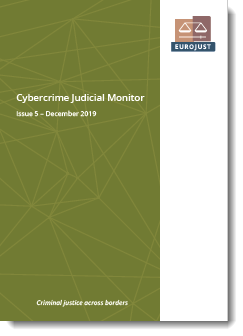 The rapidly increasing use of virtual currencies raises questions for judicial practitioners who deal with cybercrime. Due to the unclear legal nature, transactional anonymity and high volatility in prices of cryptocurrencies, prosecutors often face difficult decisions on which measures to take in criminal investigations and prosecutions. Worldwide transactions present obstacles to establishing the right jurisdiction and possible prosecution. The recently published 5th Cybercrime Judicial Monitor of Eurojust focuses on these types of issues for practitioners and gives overarching insight into the applied practices of EU Member States and third countries.
The rapidly increasing use of virtual currencies raises questions for judicial practitioners who deal with cybercrime. Due to the unclear legal nature, transactional anonymity and high volatility in prices of cryptocurrencies, prosecutors often face difficult decisions on which measures to take in criminal investigations and prosecutions. Worldwide transactions present obstacles to establishing the right jurisdiction and possible prosecution. The recently published 5th Cybercrime Judicial Monitor of Eurojust focuses on these types of issues for practitioners and gives overarching insight into the applied practices of EU Member States and third countries.
The Cybercrime Judicial Monitor pays extra attention to the legal framework and policies in different countries covering the seizure and handling of virtual currencies during investigations. It lists challenges and obstacles for prosecutors when seizing and possibly converting virtual currencies at different stages of an investigation.
Based on information provided by members of the European Judicial Cybercrime Network, the monitor also provides an overview of latest data retention developments, particularly those pertaining to the application of EU data retention rules. It delves into national legislative developments and recent landmark court rulings in relation to cybercrime and e-evidence gathering.
Courts ruled on different cyber-related matters in 2019, such as law enforcement authorities (LEA) accessing accounts of suspects using a tool such as a key logger, or a device using a suspect's fingerprint, and accessing data abroad via a third party network search. In addition, a Belgian ruling of the Court of Cassation is analysed, focussing on the obligation of service providers to cooperate with LEA. Many other national court rulings are also summarised in this issue.
This 5th Cybercrime Judicial Monitor is the first one that is being made available to the public from the outset. Earlier versions of the Cybercrime Judicial Monitor were, until recently, distributed to a limited audience, but have since been declassified.
